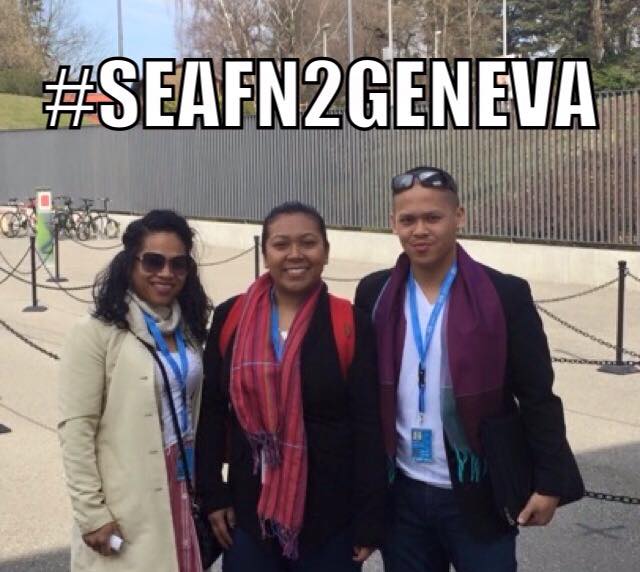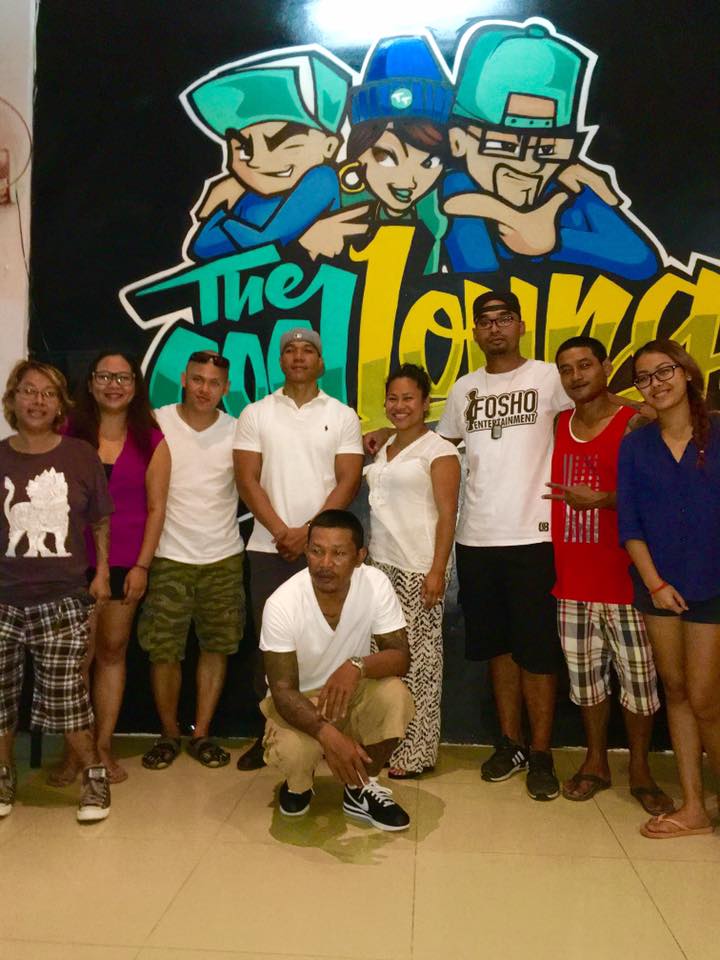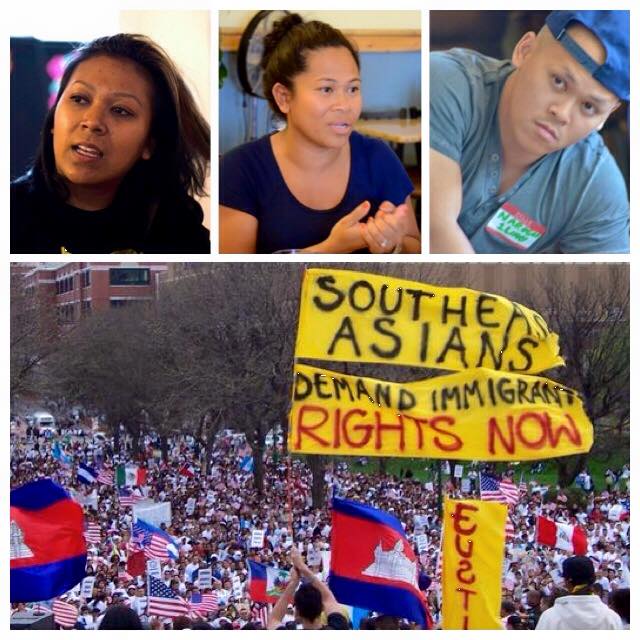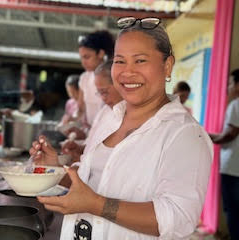This Women’s History Month, we spoke with Chhaya Chhoum (she/her), Executive Director of the Southeast Asian Freedom Network (SEAFN), about her three decades of community organizing. Read on as she shares her experiences and reflections as a woman of color in leadership.
SEAFN was founded in response to the 2002 U.S.-Cambodia Repatriation Agreement, which created a “gateway for deportations.” In the face of this crisis, several grassroots organizations responded to my call for a united front against the deportation of Cambodian Americans. Today, we are a national family of Southeast Asian organizations working to build our political power and self-determination.
As the first collective to engage in anti-deportation work, we uplift local organizations and leaders, strengthening the movement as they respond to each crisis. By prioritizing on-the-ground support, we help organizations mobilize and take action in their communities.
While our roots are in anti-deportation work, we have since expanded to include gender justice, youth justice, anti-imperialism, abolition, and fighting anti-Blackness within our communities.
This year, we are continuing the SEARR campaign, a multi-year initiative dedicated to securing concrete, long-term relief for Southeast Asians at risk of deportation while holding the U.S. accountable for its role in displacing our communities. The SEARR Campaign pushes for federal policy changes, provides direct support for impacted individuals, and strengthens grassroots organizing to ensure our people can remain with their families and communities.

Our Struggles & Liberation are Interconnected
Justice work is never just about one issue–our struggles and liberation are interconnected. The ripple effects of our histories and intersectional identities have shown up in many ways throughout my decades of organizing, and this shows why our approach is crucial. Our lived experience as refugees of U.S. warfare gives us a distinct perspective on American imperialism and the military-industrial complex. This history fundamentally shapes our organizing approach, differentiating our work from other immigrant communities. We confront the specific violence of state systems that doubly punish refugees: first through displacement, then through immigration enforcement, creating cycles of family separation that compound the trauma of war.
Through our deportation work, we seek to end this cycle of punishment and “resettlement” by demanding that our people be pardoned for their societal crimes with the right to return to the U.S., if they choose. In this immigrant-criminal paradigm, we need more Southeast Asian community organizers, a strong ecosystem to build our political power, and a bold economic and political vision for the next 50 years and beyond—all while standing in solidarity with Black and Brown communities.
As a woman in leadership from the Bronx, I speak up for the protection of women and children in our communities from patriarchal violence. As a survivor of genocide, I know the trauma of war, displacement, and state violence still shapes our lives today. As a Southeast Asian organizer without a clear model to follow in the U.S., I navigate daily insecurities born from the lack of infrastructure and support, often questioning whether I am “enough.”But I lean hard on lessons of resourcefulness, generosity, and unwavering love, finding humor and joy even in the face of injustice to ground me and set me free. These lessons are so important in this moment of heightened fear and authoritarianism.
Liberation isn’t just about resisting oppression–it’s about committing to justice outside of, and within, our own communities.

A Message to Future Generations
People often ask me how I stay in this fight after 20 years. The truth is, I’ve never lost my commitment to our community and to the vision of a liberated world. I know I may not see full liberation in my lifetime, but that doesn’t mean I won’t fight for it every single day.
When I feel burned out or disillusioned, I return to the people who remind me why we do this. I surround myself with organizers who love their people as much as I love mine. That’s what keeps me grounded.
If I could leave people with three critical lessons from our work, they would be:
- We are here because the U.S. was there. The U.S. waged war in Southeast Asia that impacted countries beyond Vietnam – it devastated Vietnam, Cambodia and Laos. The consequences still impact our communities today, and we want to reclaim our narrative to speak to the nuances and complexities of our lived experience as refugees of U.S. warfare.
- The U.S. refugee resettlement program failed us, and our communities deserve better. In response, we’ve built our own practical systems of care, refuge, mutual aid, and resilience. I think of my family’s Cambodian grocery store in the Bronx, which became a community hub and shaped my early years of organizing as a youth.
- The future is rooted in community organizing. We are actively building a movement alongside organizations like SEA Action, a C4 organization focused on gaining political, social, and economic power for our communities. Our vision is one of true self-determination, where we are free from gender-based violence, stand in deep solidarity to build a multiracial democracy, and have the power to shape our own futures. The challenges we face today cannot be solved by legal action alone; they require a long-term commitment to organizing, base-building, and leadership development. Real change happens when we build up our people for the long haul.
As I reflect on my years in this movement, I’d like to share this message with the young organizers: We need you. There is support here, lessons to be learned, and love and joy in this movement. This is a lifelong commitment, and I hope you choose to be a part of it. I will always believe in the power of grassroots organizing—the power lies here and in its people.
For those who want to learn more, I encourage you to watch the Taking Root docuseries and support our ongoing advocacy. As we mark the 50th anniversary of the U.S. Wars in Southeast Asia, I encourage reflection on how our past shapes the present and the realities our communities face today.
Our goal is not just freedom; it is true liberation. I encourage our communities to move beyond the scarcity mindset we’ve understandably adopted and towards actively striving for a sense of “enough.” Not excess driven by capitalist conditioning, nor deprivation shaped by our past struggles, but a balance that sustains us. There is abundance in this country, and it’s enough for everyone today and for generations to come.

–
Born in Cambodia in 1978 during the fall of the Khmer Rouge, Chhaya and her family fled to refugee camps before resettling in the Bronx, where they faced urban poverty and systemic oppression. At 16, she joined CAAAV, mobilizing Asian immigrant communities against worker exploitation, police brutality, and deportation. She later became the director of CAAAV’s Youth Leadership Project, organizing youth and adults for justice.
In 2012, Chhoum co-founded Mekong, a Bronx-based organization empowering Cambodian and Vietnamese communities through arts, culture, and advocacy, and is now SEAFN’s Executive Director.
Follow SEAFN on Facebook here.
